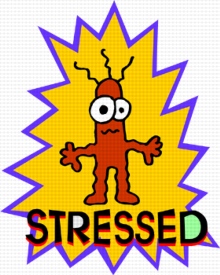"When my boyfriend told me he was leaving my world literally fell apart. I hadn't realized how much my life revolved around our relationship. Within seconds I went into shock."
I couldn't eat, I couldn't concentrate, I was restless. I cried at the drop of a hat. Studying was like trying to read Nietzsche in the middle of a tornado. Formerly a top notch student, I couldn't put two concepts together to save my life. My exams were a blur."

Heartache like this catapults us into a state of being that triggers the brain survival mechanisms. The brain fixates on the lost love..it's almost as if nothing else matters.
...and yet it still does.
If you're like most folks, you've had the experience of an emotional meltdown reaching crisis proportions. Memory goes offline and it's hard to concentrate. Yet the ability to use all of your "brain power" is essential just for getting through life, let alone getting top grades in school.
Most people think that counseling is all about resolving a crisis. While a part of it sure is, counseling is so much more than this. What few realize is that working on any emotional issue frees up the brain for all kinds of processes (including better concentration and memory).
This is what we do when we go to counseling (whether we are consciously aware of it or not).
We increase the brain's capacity to learn, and thus to adapt.
How does this work?
As you resolve an emotional crisis in therapy, you naturally benefit from a more "stable" brain. And with a more balanced brain (a.k.a. the autonomic nervous system) you're better able to modulate intense emotional states.
Recall that the brain is divided in two hemispheres, the right-brain and the left-brain. Simplistically speaking, the left-brain is our "thinking" brain while the right is the emotional brain.
Each half processes different kinds of information. The left "thinks", the right "feels". While both sides attempt to resolve problems in life, it's the left-brain that we're normally more aware of.
In other words, we tend to identify ourselves with our thoughts.
For many folks, the right brain works in the background. For example, if you go to bed thinking of a situation that's not resolved it's more likely that the right-brain will take care of it. While you sleep it churns away at the problem, so that you often wake up with a solution.
The right-brain sees the big picture. The left-brain sees the details.
Ordinarily, the right and left-brain work together. However, if I'm feeling distressed about my relationship my right-brain starts to take over. The more stressed I am, the more it dominates my thinking left-brain.
How does this affect my studying?
Instead of concentrating on my history test, or unraveling the latest chemistry puzzle, my brain keeps shifting into emotion-based thoughts:
- What will happen if I fail?
- What will my parents say
- I'm just no good at this. I'm not good at anything
- ...I'll never get this done.
When the right-brain gets worked up as we become absorbed in emotional turmoil it hijacks the left-brain. The greater the disturbance, the harder it is to concentrate on anything else.
Plagued with negative self-talk, we surrender to overwhelming right-brain processes. The engine driving the show now is the right brain.
The mind body connection.
Now here's something very important. Our emotional experiences are totally body-based. That's what two decades of neuroscience research have made clear.
Emotions and body sensations are biologically related. Yet we often don't connect the two in our minds because the right-brain doesn't distinguish between physical sensations and what we label as "emotions".
For example, when my shoulders are tense due to the stress of an upcoming exam, it's coming from my right-brain. Whether it's a recognizable "emotion' or the stress of a deadline, the increase in arousal is the same.
Our "alarm center" resides in the right brain.
The alarm center alerts us to danger in the environment, be it emotional or survival-based. Emotions are inextricably tied to our alarm center. The cumulative effect is that we'll eventually get distracted by things only a highly trained bodyguard would notice. We get so amped up that even a hiccup can feel dangerous.
Here's what I mean.
I'm trying to study but my mind keeps insisting ......
- What was that sound?
- What are those guys doing over there?
- Where's that light coming from?
Or we feel it as...
- Gosh, I can't sit still.
- I gotta get out of here.
- Gee, I'm hungry again.

In other words, the alarm center in the brain goes into "alert' mode and becomes easily distracted, "hijacking" our behavior in ways that can totally absorb our energies.
Noise, people, food, sleep...all these things become more distracting or tempting when we're in a heightened arousal state.
Here's how to tame the emotional brain.
You may have noticed that people try to battle thoughts with thoughts...they try to think themselves out of an emotional paper bag.
Now if you've been following along you've learned that body-based emotions can severely compromise the left "thinking" brain's ability to concentrate on tasks we're trying to accomplish.
What you may not know is that calming the body (i.e. accessing the right-brain stress centers) automatically calms left brain-based processes.
What activities calm the right-brain?
Well, counseling for one. Anything that helps to resolve emotional issues helps the left-brain to work better.
(But it means allowing your therapist to guide you, rather than expect advice or definitive answers for fixing your problems. Look within yourself for answers.)
Yoga, tai chi, Aikido, any body-centered activity where you concentrate on the internal sensations of your body also calms the brain. A regular hot bath can help in the same way. Activities like these have a direct impact on the right-brain centers for reducing stress.
What does this mean for your counseling?
Be an active participant in your own healing. Take risks in sharing aspects of your life you've typically kept hidden. Moving through the discomfort of shame helps your right brain resolve emotional matters.
It means letting yourself feel your emotions as you work with your counselor.
Bring awareness to the physical sensations that arise. Notice how the knot in the tummy or rigidity in your shoulders soften as you work through the issues driving the session.
Finally, it literally means showing up for your therapy appointment.
Even if the pressures of being a student are difficult to set aside, consider how your next session might bring relief and with it a less stressed, and more productive, brain.
By focusing on right brain processes, you optimize the ability of both right and left to work together.
And when the right brain and the left brain shake hands, it means better concentration and a better chance at good grades.
...not to mention a better chance at happiness!
This article was written by Vancouver Psychologist Dr. Janice Stuart, Coquitlam Psychologist Dr. Carole Gaato, & Dr. Susan LaCombe.

